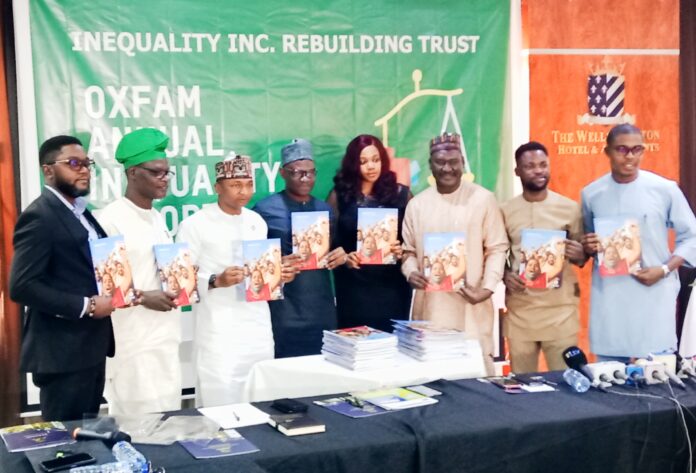...We must hold government accountable, responsible for inequality-CISLAC
Our situation in Nigeria can trigger crises-CODE
…We are working towards eliminating frivolous budgetary provisions-BudgIt
By Lubem Gena, Abuja
An international organisation, Oxfam, has said, as more people around the globe continue to languish in poverty and the tax system remains inequitable, inequality will sadly continue to grow and further throw more people into abject lack of basic material things.
Oxfam Nigeria chapter stated this in its inequality report which was released later today in Abuja during which it emphases that, ‘seven richest Africans have more wealth than the poorest half of the continent’s population’.
“Africa’s richest 1 percent own nearly half of the continent’s financial wealth.
“a tax of upto 5 percent on Africa’s super-ruch could generate an annual amount of $11.9billion, nearly enough to pay for the 2023 Humanitarian requirements for Eastern and Southern Africa.
“Oxfam urges a new era of public acts, including public services, corporate regulation, breaking up monopolies, and enacting permanent wealth and excess profit taxes”, the organisation said.
Addressing journalists, the Country Director of Oxfam Nigeria, Mr. Tijjani Hamza the inequality which was released today across the world as business elites gather in Swiss resort town of Davos, “finds that seven out of the ten of the world’s biggest corporations, some with significant presence in Africa, have a billionaire CEO or principal shareholder. The corporations are worth $10.2 trillion, equivalent to nearly four times the combined GDPs of African countries.
“Our rigged economies are benefitting the super-ruch while governments are struggling to provide crucial public services like healthcare and education to Africans across the continent. Governments must step up and ensure corporations stop squeezing workers, dodging tax, and plundering our planet in their quest for massive profits. If left unchecked, these corporations will continue to widen the inequality gap”.
He said, in the past three years’ supercharged surge in extreme wealth has solidified while global poverty remains mired at pre-pandemic levels.
While stating that, the world’s five richest men have more than doubled their fortunes from $405 billion to $869 billion since 2020 —at a rate of $14 million per hour— while nearly five billion people have been made poorer. If current trends continue, the world will have its first trillionaire within a decade, but poverty will not be eradicated for another 229 years.
“Billionaires are $3.3 trillion richer than in 2020, and their wealth has grown three times faster than the rate of inflation.
“Despite representing just 21 percent of the global population, rich countries in the Global North own 69 percent of global wealth and are home to 74 percent of the world’s billionaire wealth.
“Aliko Dangote, Africa’s richest person, holds a “near-monopoly” on cement in Nigeria. He owns Dangote Cement, which has enjoyed some of the world’s highest profit margins on cement (45 percent) while paying a tax rate of 1 percent over 15.
“In Nigeria, Aliko Dangote owns more wealth than the bottom half of Nigerians (109 million people). Dangote and Abdulsamad Rabiu, the country’s second richest man, have increased their fortunes by 29 percent since 2020, while the bottom 99 percent have become poorer”, he added.
Oxfam also frown at a December 2023 report where the Nigerian Investment Promotion Commission said it approved tax holidays for 34 companies seeking tax incentives and waivers under the Industrial Development Income Tax Act of 2023; among the beneficiaries are Dangote Sino Trucks West Africa Limited, Lafarge Africa Plc, Honeywell Flour Mills Nigeria Plc, Jigawa Rice Limited, and Stallion Motors Limited.
Also speaking at the occasion, the Executive Director of Civil Society Legislative Advocacy Centre (CISLAC), Mr. Auwal Musa (Rafsanjani) said several incoherent practices which have persisted over the years have contributed immensely in bringing about inequality in the world with particular reference to Nigeria.
He mentioned such practices to include weaponisation of poverty by the ruling elite, turning tye electoral process into business venture by politicians, lack of the will to arrest and punish offender by security agencies.
Mr. Musa insisted that to end poverty and inequality, development oriented leaders, attitude of discipline and accountability must be institutionalised in order to apply sanctions and block leakages.
Mr. Hamza Lawal, the Chief Executive Officer of Connected Development (CODE) insisted that the time has come for all multi-level stakeholders to strive to end the double barrel menace of inequality and injustice as.melted out on the less oppressed and downtrodden members of the society.
The accountability network, BudgIt, representative, Mr. Andrew Oaikhena said on its part, his network has been ensuring that budgetary provisions are devoid of frivolus insertions that will not add value to the ordinary man.
Meanwhile, Mr. William Mafwalal, a programme officer with Oxfam said the gap between the rich and the poor which eliminated the middle class must be closed to ensure that some don’t enjoy too much affluence while the rest wallow in penury.
By way of solution, Oxfam therefore called on governments to bridge the inequality gap by revitalising the state; reining corporate power including breaking up monopolies and democratising patent rules; reinventing inclusive and sustainable business; administrative suspension placed on processing Pioneer Status Incentive (PSI); urged the Nigerian Senate to sustain efforts to amend the Federal Inland Revenue Service (FIRS) Act as well as suggested that Parliamentary oversight should be thoroughly done on tax incentives.
…



